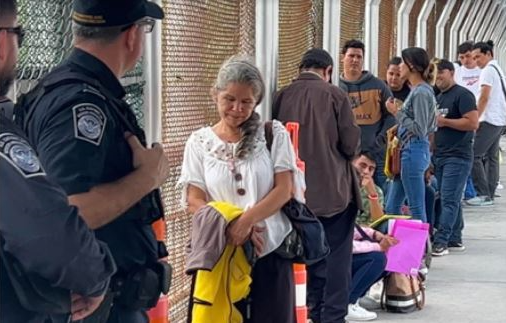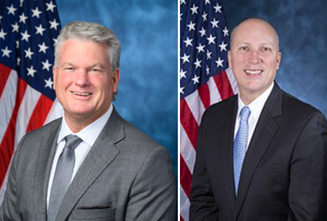
AUSTIN, Texas — Revelations that the U.S. Department of Homeland Security has discretely granted “humanitarian parole” entries into the United States and two-year work permits to more than 85,000 Mexican nationals who used the “CBP One” mobile phone app have raised no official Washington curiosity since a Center for Immigration Studies Freedom of Information Act lawsuit in November revealed the unannounced activity.
The United States, after all, has never considered Mexico so dangerous that it would grant humanitarian protection to such broad swaths of its citizenry, and Mexicans rarely claim asylum because immigration judges reject them about 96 percent of the time. Neither Congress nor the Biden administration has approved any new work programs for Mexicans, or expanded previous ones.
Yet DHS granted the urgent humanitarian parole and work authorization benefit to 85,000 Mexicans out of the 420,000 noncitizens from nearly 100 nations who have applied for appointments using the CBP One app from May 1, 2021, through December 2023 — more than granted to any other single nationality, according to updated CIS lawsuit data first described in this October 24 CIS report.
After months of silence from Capitol Hill about this highly unusual program for Mexicans, two congressmen, contemplating the alleged murder of Athens, Ga., nursing student Laken Riley by a Venezuelan reportedly granted the parole benefit recently extended their inquiry to the huge number of Mexicans allowed to use the CBP One mobile phone app. That would qualify them as the first federal lawmakers to ask about the unusual distribution of the benefit to Mexicans.
DHS has not responded to phone and email requests to DHS or U.S. Customs and Border Protection officials for comment about the Mexicans.

“Considering DHS itself claims that ‘only noncitizens who can be considered for a humanitarian exception may use CBP One,’ this raises questions as to why Mexican nationals are receiving parole on such a broad basis,” wrote Chip Roy (R-Texas) and Mike Collins (R-Georgia) in a March 1 letter to the DHS chief. “Indeed, Mexican nationals rarely meet the circumstances to qualify for asylum — in the first half of FY 2023, immigration judges granted asylum to a mere 4 percent of Mexican nationals who filed for protection.”
The Republican congressmen from Texas and Georgia allege that President Biden’s DHS has abused the parole authority provided for in the Immigration and Naturalization Act to allow small numbers of “case-by-case” temporary entries of noncitizens if those would serve urgent humanitarian needs or significantly benefit the American public for a specific unique purpose.
“This practice of circumventing the law by unlawfully paroling thousands of inadmissible aliens into the country, which, as we tragically saw in the case of Ms. Riley, can pose devastating impacts on our communities,” the congressmen wrote in their letter, which went on to enumerate questions about the Mexican citizens.
In January 2023, the administration expanded use of the phone app “legal” crossing program to better manage the in-flows of presumably persecuted people in dire need of a temporary humanitarian entry from dangerous home countries like Venezuela, Cuba, Nicaragua, and Haiti who would all probably apply for asylum in America soon. The administration authorizes recipients for two-year renewable work permits.
But no nationality saw higher grants than Mexicans, a circumstance that has drawn incredulity among almost everyone with knowledge about humanitarian protection programs.
“If true, I find this figure shocking, bizarre, and absurd, not to mention flatly inconsistent with our nation’s immigration laws,” former ambassador to Mexico Christopher Landau told me. “As a lawyer, a former U.S. Ambassador to Mexico, and someone who knows that country well, I cannot fathom any legal or factual basis for granting such extraordinary relief en masse to so many Mexican citizens.”
Andrew R. Arthur, a CIS fellow who served as an immigration judge considering asylum cases for nine years, was no less perplexed over the revelation.
“The whole purpose of the scheme is to allow people to file protection claims on humanitarian grounds,” Arthur said the CBP One entry scheduling app. “But few if any Mexicans ever have valid claims for U.S. protection. There’s nothing that suggests the Mexican government either tortures or acquiesces in the torture of its own nationals. And so it makes no sense whatsoever to allow Mexicans to make those claims.”
The continued lack of official curiosity about the growing Mexican use of the CBP One app has led some to speculate that it reflects an unauthorized work program for Mexican President Andres Manuel Lopez Obrador, who had often pressed for wider access to U.S. labor markets.
If so, perhaps the Biden administration used it as leverage recently to have Mexico crack down in an unprecedented, widespread way on illegal migration through Mexican territory, to reduce the negative political optics of large-scale crossings at the U.S. border ahead of the 2024 presidential election. (See CIS’s “Recent Sky-High Levels of Illegal Migration Are Dropping Fast — and Here’s Why” and “Inside ‘Zone 47’: Biden’s Ruthless Mexico Immigration Crackdown Is Working, but Media Won’t Tie Him to It”.)
Daily illegal crossings have since fallen from the media-appealing peaks of 12,000 and 14,000 per day all along the southern border to a still-overwhelming 5,000 and 6,000 per day.
Any connection between the Biden administration’s creation of what appears to be a new, unauthorized Mexican work program and its demand that Lopez Obrador tamp those numbers down until the November election is, of course, speculative. But speculation is inevitable in the absence of answers to questions like those Reps. Roy and Collins have posed.
